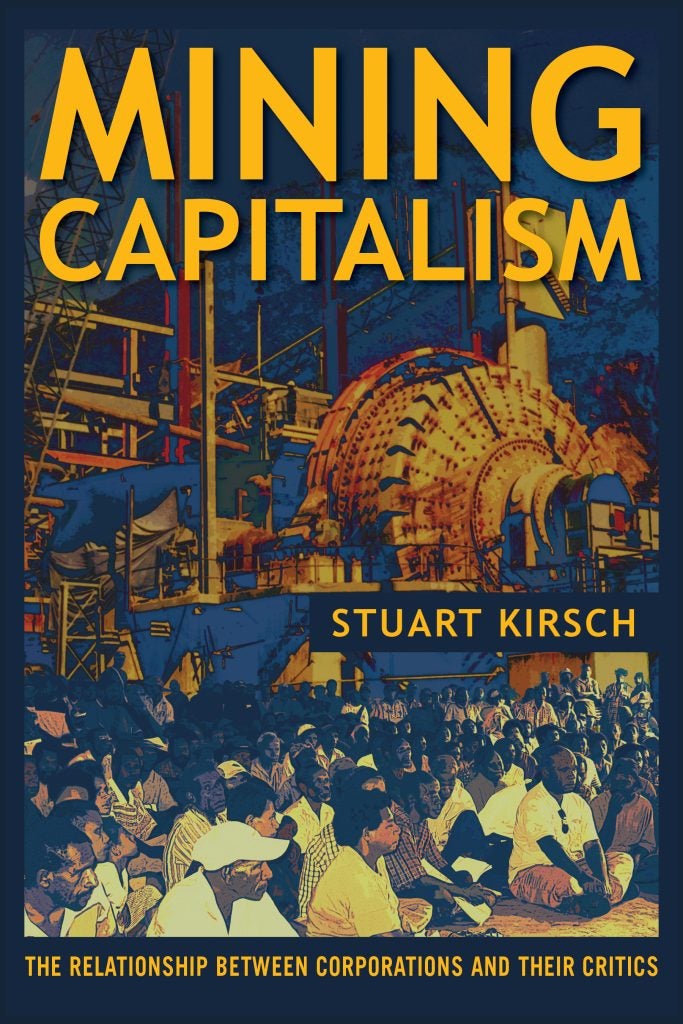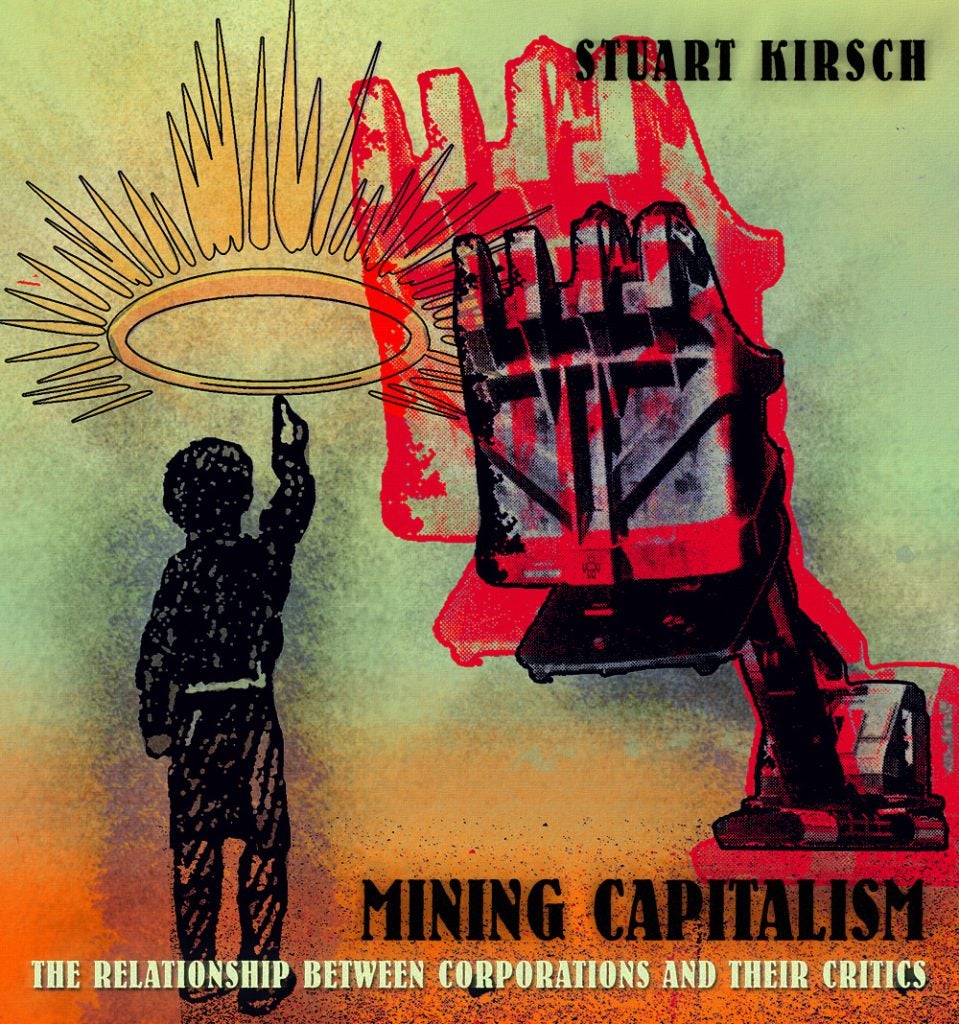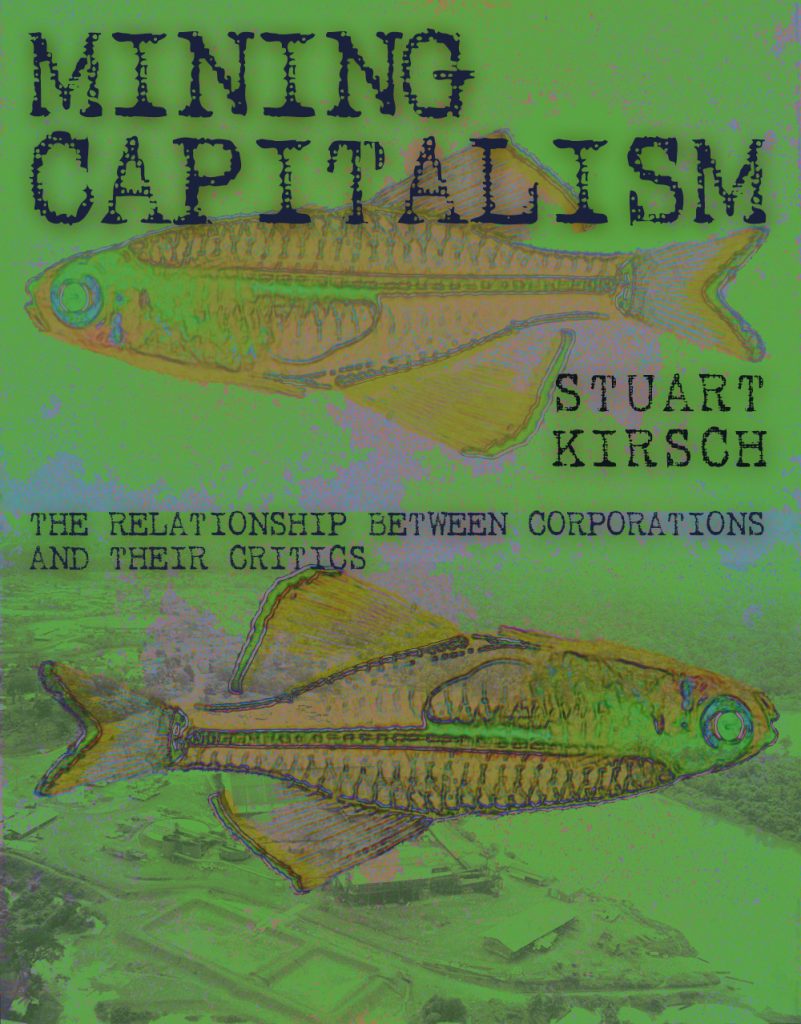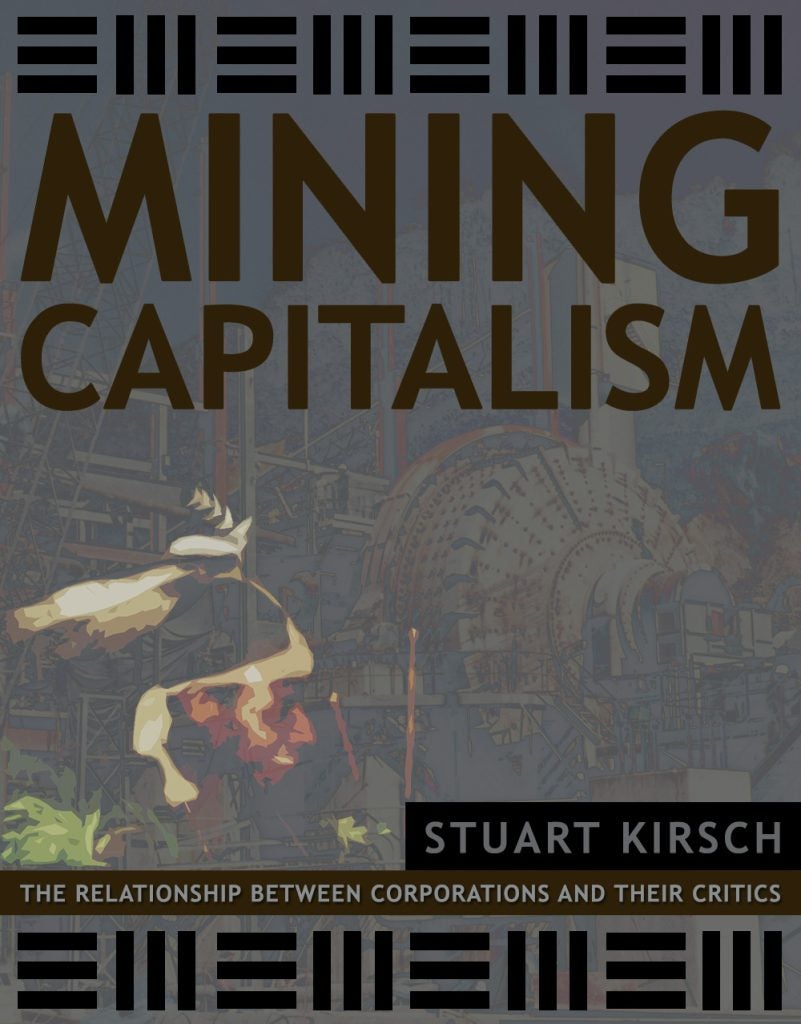
mining capitalism (2014)
University of California Press
Mining capitalism: The relationship between corporations and their critics
Corporations are among the most powerful institutions of our time, but they are also responsible for a wide range of harmful social and environmental impacts. Consequently, political movements and nongovernmental organizations increasingly contest the risks that corporations pose to people and nature. Mining Capitalism examines the strategies through which corporations manage their relationships with these critics and adversaries. By focusing on the conflict over the Ok Tedi copper and gold mine in Papua New Guinea, Stuart Kirsch tells the story of a slow-moving environmental disaster and the international network of indigenous peoples, advocacy groups, and lawyers that sought to protect local rivers and rain forests. Along the way, he analyzes how corporations promote their interests by manipulating science and invoking the discourses of sustainability and social responsibility. Based on two decades of anthropological research, this book is comparative in scope, showing readers how similar dynamics operate in other industries around the world.

media
Listen online: “Mining Science.” (53.5 minutes), Paul Kennedy, IDEAS, CBC Radio Canada, March 2016.
Read interview: “Mining Capitalism: An Interview with Stuart Kirsch” by Chitra Venkataramani and Chris Hebdon, Anthropology and Environment Society blog, December 2105.
Read review exchange with Fabiani Li (author of Unearthing Conflict, 2015): Journal of Cultural Economy 9(4): 433-443, 2016.
testimonio
“I just wanted to tell you how much I am enjoying teaching Mining Capitalism, now for the second time, to my Indigenous Peoples and World Politics class.
Mining Capitalism opens students eyes and minds to a world of politics that most were completely unaware of, and forces them to confront difficult questions about our taken for granted development models that cannot just be wished away. This can be frustrating for some, who hold out hopes for a green capitalism, or green mining, but this is a productive frustration. It also shows them ways that they might one day get involved in these issues, as scientists, activists, attorneys, investors, members of a business community, and perhaps even as anthropologists. They are particularly impressed by the decades of advocacy work you have done in PNG and around the world, related to these issues. Of course, the implications extend far beyond the mining industry.
For a generation who come to their social and political consciousness under a dark cloud of seemingly inevitable environmental destruction, war, debt, and corporate hegemony, this book provides a clear introduction to ongoing struggles to create a better world. It also offers a glimmer of hope that there is something still worth fighting for, that we can stop some problems before they start, as an antidote to the all encompassing pessimism.” —Nick Copeland, Virginia Tech, co-author of The World of Wal-Mart: Discounting the American Dream.
endorsements
“A much-needed contribution to understanding our contemporary historical moment. Kirsch adeptly moves his focus between close-to-the-ground descriptions of corporate practices and persuasive claims about the ways corporations work to control meaning and money.” —Kim Fortun, author of Advocacy after Bhopal.
“Mining Capitalism takes us from the devastation of a river to the courtrooms and commissions where activists and thieves reimagine its truth and consequences. This is a thrilling story, and everyone should read it. As both participant and perceptive observer, Kirsch offers us engaged anthropology at its very best.” —Anna Tsing, author of Friction and The Mushroom at the End of the World.
“A richly detailed study of corporate attitudes towards natural resources and the politics that inform indigenous movements facing capitalist interests. This is a vivid account of how the globalization of nature affects societies that have vastly different understandings of what natural resources mean.” —Arjun Appadurai, author of Modernity at Large.
reviews
A “scholarly adventure.” —David Walker and Fern Brunger, Canadian Journal of Native Studies
“Riveting, original and important… Well-written and intimate account of what has been a deeply complex social and legal issue… Kirsch’s polemic is convincing and damning.” —Michael Main, The Australian Journal of Anthropology
“Kirsch writes from a position of deep ethnographic integrity and clear expertise. Mining Capitalism‘s tone is calm and considered, not argumentative or one sided. Kirsch is broadly skeptical of corporate capitalism, but he is clear-eyed in his assessment of the limits and challenges of activism and never seems partial or tendentious. The style is uncluttered rather than inflammatory. Yet the book never drags… and will doubtless be central to future literature on mining and capitalism.” —Alex Golub, American Ethnologist
“Mining Capitalism is an inspiring reading of the conflict between local communities and large mining projects… The personal involvement of Kirsch in the processes he describes is at times very palpable; the reader feels that there are still bills to settle with some opponents, but after the analysis presented here, that is completely understandable.” —Marjo E. M. de Theije, Anthropos
“A fresh, instructive, and often moving account. Throughout the book, Kirsch explains his chosen political and ethical stance and challenges a number of positions with which he disagrees. While I occasionally wished for Kirsch to allow a somewhat wider range of tolerable rapprochements of ethics and pragmatics, I appreciated his willingness to take them on so forthrightly. His ability to tell a highly detailed and technical story in an engaging, at times even gripping way, means that the book will be welcomed not only by scholars of mining and corporations but by undergraduate and non-academic readers as well.” —Elizabeth Ferry, Journal of Anthropological Research
“Mining Capitalism covers a wide expanse of temporal and spatial ground. This is possible, in large part, because of Kirsch’s long-term fieldwork in Papua New Guinea and active participation in the global processes that the book describes. There is something rather extraordinary about the way Kirsch, writing in 2014, is able to quote from material that he published in a Papua New Guinea newspaper in 1989; or the way that Kirsch’s analysis of the legal case in the 1990s includes his own involvement in the proceedings; or how Kirsch’s insight into the World Bank’s extractive industries review comes from his own participation in the process. These dynamics not only reflect the depth of experience and material of Mining Capitalism, but also say something about the timescales and shifting political contexts that research on the mining industry often requires. Kirsch describes himself as inherently cynical. In light of ghost forests along the Ok Tedi river and the devious ways mining companies undermine opposition, it is not hard to see why. And yet, notwithstanding the book’s acknowledgment of the inherent limits of the legal system and networked NGOs, what I appreciate about Mining Capitalism is its overall tone. While it provides a sobering account of ‘the possibilities and the limitations of political engagement’, Mining Capitalism leaves little conceptual space for standing idly by in the face of ongoing social and environmental injustice.” —David Kneas, Environment and Society
“Vividly demonstrate[s] the substantial contribution of ethnography to understanding the nexus of power relations built in and around corporations… [and] provides the theoretical grounds for an analytical and conceptual critique of the ubiquitous place and role of corporations across the world.” —Filipe Calvão, Political and Legal Anthropology Review
“Despite the coercive tactics of the mining industry, Kirsch is optimistic about the ability of social movements to challenge the industry in new and creative ways. If you think that large-scale, destructive mining projects are inevitable, this book will make you think twice.” —Al Gedicks, author of Resource Rebels: Native Challenges to Mining and Oil Corporations
“Extremely relevant and timely topic in the present context of controversies over natural resource projects arising all around the world. Rather than casting the Ok Tedi mine case as the exception, his compelling story brings to light the underlying commonalities with other conflicts, whether in mining or other industrial sectors. Those unfamiliar with Kirsch’s previous work might be startled by his strong political positioning against the Ok Tedi mine and corporations in general, which breaks with the anthropological tradition of suspending one’s political engagement when conducting ethnographic research… Whether or not one agrees with Kirsch, he has to be commended for pursuing an engaged anthropology. [In addition to] explaining the way global capitalism constitutes and maintains itself in the face of its devastating social and environmental impacts, Mining Capitalism aptly responds to the call for greater attention to corporations…. Individually comprehensive analytic chapters, ending with a conclusion that greatly summarizes key ideas, makes for smooth and accessible reading, even for readers unfamiliar with mining issues or Melanesia – or anthropology, for that matter. This last point is not negligible; after all, it is in the interests of the common good that as many people as possible develop a keen eye to avoid being fooled by corporations’ mollifying words.” —Catherine Morin Boulais, Anthropologica
“The starting point of Kirsch’s multi-sited inquiry is downstream, amidst the ‘mass destruction’ (LeCain 2009) produced by the mine. Yonggom people drew their subsistence from the local rainforest and savannah before the mine discharged 2 billion metric tons of tailings, overburden, and waste rock into the Fly River system, producing a slow-moving environmental disaster by polluting the water and causing flooding and vegetation dieback. As capital-intensive mining companies have developed ever-greater capacities to mine low-grade ore and have turned to riverine tailings disposal to cope with the massive amounts of waste generated, they have provoked fresh opposition and critique. To counter critics, companies have developed an arsenal of ‘corporate social technologies’ (Rogers 2012) meant to reassure, coopt, and disable them. Kirsch persuasively argues that this dynamic relationship between corporations and their critics is central to the constitution of contemporary mining capitalism.” —Marina Welker, Comparative Studies of Society and History
“Taking Kirsch’s claim that the ‘fundamental dilemmas of contemporary capitalism cannot be resolved’, we might be led to the conclusion that his is a totalizing analysis devoid of hope. That would, however, be a misplaced assessment of Mining Capitalism. Kirsch’s decision to ‘study up’ by examining the ‘dialectical relationship between corporations and their critics’ reveals not only ‘incremental progress’, but also ‘new forms of contestation’ that emerge at every such encounter. Kirsch [offers a] dialectical, skeptical (and slightly cynical) template for ethnographic engagement.” —Paul Gilbert, Social Anthropology
“A very encompassing book. Kirsch outlines two different strategies, the politics of space and the politics of time. The politics of space is used to deal with how indigenous people and NGOs organize in ‘transnational action networks’ and how this enables them to ‘replicate the geographic distribution of capital by putting pressure on the corporation wherever it operates’. Global, boundary-crossing corporations are today matched by global, boundary-crossing NGOs. The politics of time is used to deal with ‘the means by which elites extend their power over the body politic through their control over the social construction of time’. We think particularly of the sunk costs and inertia permeating mining projects. Once started, they are usually very difficult to challenge; talk about a rock solid path dependency! This makes Kirsch conclude that focusing on the time before a mine is opened is a more hopeful strategy when aiming to prevent environmental harm. This is also a debate that has emerged in Sweden rather recently. A very rich and thought-provoking book.” —Johan Sandström and Tommy Jensen, Organizing Rocks
“The book provides an insider’s view of the claims and counter-claims and of tactic against counter-tactic. The events and the book’s narrative derive from Kirsch’s ethnographic and political involvement with the anti-mining forces. His engagement and commitment lead him to the optimistic conclusion that the counter-forces inherent within civil society can have important effects on the largely destructive power of the corporation, despite the latter’s consistent ability to recover from attacks.” —Matthew Libassi and Nancy Lee Peluso, Development and Change
“A must read for those interested in PNG’s future, activists, researchers and anyone on either side of the dialectical” relationship between extractive industry and “impacts on communities, especially in developing countries.” —Charles Roche, Mining Monitor
“Kirsch proposes ‘the politics of time’ as a new set of activist strategies… Instead of waiting several years to observe, document and prosecute a mine for its harmful effects, Kirsch proposes early intervention. The politics of time is designed ‘not to stop all new mining permanently but rather to compel the industry to improve its practices.’” —Shaun Gessler, Asia-Pacific Viewpoint
“Mining Capitalism reminds us of how corporations’ response to their critics both reinforce corporate power amid neoliberal capitalism and create new oppositional strategies for social movement actors. Kirsch has written a laudable book at a time when the combination of intrusive extractive industries and creative neoliberal corporate maneuvering is in full swing on a global scale.” —Peter C. Little, Journal of the Royal Anthropological Institute
“Vividly exposes the strategy developed by mine-affected communities… to build alliances with activists, environmental nongovernmental organizations, and lawyers and to unfold networks beyond the limits of the local. The methodological choices made by Kirsch… are consistent with his positioning as ‘participant observer’ within the networks actively engaged in claims against the corporation, and the result gives room for a rich, insider’s account and analysis. It might have been useful to broaden the scope to encompass the relationship of corporations not only with their critics but also their supporters [given that] symmetry as an anthropological principle—studying all the stakeholders on an equal methodological footing—is also a sign of commitment to the politics and ethics of ethnography. However… the account delivered by Kirsch and the clarity of his positioning make this book a fascinating piece of work, well worth reading.” —Pierre-Yves Le Meur, The Contemporary Pacific
“In a multi-sited ethnography that takes him from Dome village to Melbourne, London, and beyond, Kirsch examines Yonggom efforts, with which he actively collaborated, to seek redress in the courts for environmental damages. He stuck with the Yonggom, negotiating a role as anthropologist/ activist that respected their ability to speak for themselves on an international stage, yet articulating their story in other places to which he had access. Mining Capitalism should be read with interest by university students and general readers seeking to understand global corporations and their operations.” —Patricia Townsend, Pacific Affairs
“Mining Capitalism, the sequel to Stuart Kirsch’s Reverse Anthropology, examines the relationships between corporations and their critics. He considers that the dialectical relationship which exists between mining corporations and their ‘NGO and indigenous critics’ has become a permanent structural feature of neoliberal capitalism… He proposes to look at the conflict between mining corporations and communities as examples of new social movements because they are focused on environmental concerns, indigenous identity and rights and civil society politics. He feels that corporations are striking back on their critics with [Corporate Social Responsibility] regimes and new [forms of] corporate science to deal with the legal and moral challenges emanating from different corners threatening their legitimacy. The book draws on long-term fieldwork with the Yonggom people living on the Ok Tedi River over the years not only as anthropologist but as an engaged participant into people’s struggle against BHP Billiton.” —Rajanikant Pandey, Indian Anthropologist
Alternative covers by akrockefeller.com




categories
-
advocacy
-
birds of paradise
-
climate change
-
compensation
-
conservation & development
-
corporations
-
dancing cats
-
deep sea mining
-
design ethnography
-
el salvador & icsid
-
engaged anthro (2018)
-
guyana
-
indigenous politics
-
lost tribes
-
methods
-
mining capitalism (2014)
-
ok tedi
-
place & time
-
property
-
reverse anthro (2006)
-
rumour
-
scientists & responsibility
-
students
-
suriname
-
west papua / refugees

